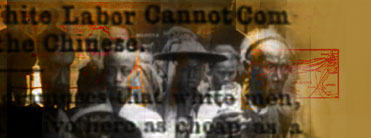 |
GOVERNOR BIGLER v.s. CHINESE MERCHANT ASING
Excerpts from California Governor John Bigler's Speech (1852)
The subject which I deem it my duty to present for your consideration before our final separation, is the present wholesale importation to this country, of immigrants from the Asiatic quarter of the globe. I am deeply impressed with the conviction that, in order to enhance the prosperity and to preserve the tranquility of the State, measures must be adopted to check this tide of Asiatic immigration, and prevent the exportation by them of the precious metals which they dig up from our soil without charge, and without assuming any of the obligations imposed upon citizens. I allude, particularly, to a class of Asiatics known as "Coolies," who are sent here, as I am assured, and as is generally believed, under contract to work in our mines for a term; and who, at the expiration of the term, return to their native country. I am sensible that a proposition to restrict international intercourse, or to check the immigration of even Asiatics, would appear to conflict with the long cherished benevolent policy of our Government. That Government has opened its paternal arms to the "oppressed of all nations," and it has offered them an asylum and a shelter from the iron rigor of despotism. The exile pilgrim and the weary immigrant, have been recipients of its noble hospitalities. In this generous policy, so far as it effects Europeans, or others capable of becoming citizens under our laws, I desire to see no change; nor do I desire to see any diminution of that spirit of liberality which pervades the naturalisation laws of the United States.
A question around which there has been thrown some doubt, is whether Asiatics could, with safety, be admitted to the enjoyments of all the rights of citizens in our Courts of Justice. If they are ignorant of the solemn character of the oath or affirmation, in the form prescribed by the Constitution and Statutes, or if they are indifferent to the solemn obligation which an oath imposes to speak the truth, it would be unwise to receive them as jurors or permit them to testify in courts of law, more especially in cases affecting the rights of others than Asiatics.
Citizenship and Race
Congress, possessing the exclusive power to establish a uniform rule of naturalization, has enacted that "every alien, being a free white person, may become a citizen of the United State," by complying with certain conditions. Of the construction of this law, Chancellor Kent remarks, that "the Act of Congress confines the description of Aliens capable of naturalization to free white persons." "I presume," continues the learned writer, that "this excludes the inhabitants of Africa and their descendants; and it may become a question, to what extent persons of mixed blood are excluded, and what shades and degrees of mixture of color disqualify an alien from application for the benefits of the Act of naturalization. Perhaps there might be difficulties, also, as to the copper-colored natives of America, or the yellow or tawny races of the Asiatics; and it may be well doubted whether any of them are white persons in the purview of the law. It is the declared law of New York, South Carolina, Tennessee, (and other States,) that Indians are not citizens, but distinct tribes, living under the protection of the Government, and consequently they never can be citizens under the Act of Congress."
It is certain that no Asiatic has yet applied for, or has received the benefits of this Act. Indeed, I am not aware that a single subject of the Chinese Empire ever acquired a residence or a domicile in any of the States of the Union, except, perhaps, in this. In this State their habits have been migratory; and so far as I can learn, very few of them have evinced a disposition to acquire a, domicil, or, as citizens, to identify themselves with the country...
I therefore respectfully submit for your consideration two distinct propositions:
1st. Such an exercise of the taxing power by the State as will check the present system of discriminate and unlimited Asiatic immigration.
2d. A demand by the State of California for the prompt interposition of Congress, by the passage of an Act prohibiting "Coolies" shipped to California under contracts, from laboring in the mines of this State. With the consent of the State, Congress would have the clear right to interpose such safeguards as in their wisdom might be deemed necessary. The power to tax as well as to entirely exclude this class of Asiatic immigrants, it is believed, can be constitutionally exercised by the State. As the subject is one of great magnitude, I have deemed it my duty to examine the opinions of eminent writers on international law, as well as the written opinions of the Judges of the Supreme Court of the United States.
Excerpts from a Letter by Chinese Merchant Norman Asing, in Response to Calif. Gov. John Bigler's Speech (1852)
To His Excellency Gov. Bigler
Sir: I am a Chinaman, a republican, and a lover of free institutions; am much attached to the principles of the government of the United States, and therefore take the liberty of addressing you as the chief of the government of this State....The effect of your late message has been thus far to prejudice the public mind against my people, to enable those who wait the opportunity to hunt them down, and rob them of the rewards of their toil....
I am not much acquainted with your logic, that by excluding population from this State you enhance its wealth. I have always considered that was wealth; particularly a population of producers, of men who by the labor of their hands or intellect, enrich the warehouses or the granaries of the country with the products of nature and art. You are deeply convinced you say "that to enhance the prosperity and preserve the tranquility of this State, Asiatic immigration must be checked." This, your Excellency, is but one step towards a retrograde movement of the government....
It was one of the principal causes of quarrel between you (when colonies) and England; when the latter pressed laws against emigration, you looked for immigration; it came, and immigration made you what you are your nation what it is. It transferred you at once from childhood to manhood and made you great and respectable throughout the nations of the earth. I am sure your Excellency cannot, if you would, prevent your being called the descendant of an immigrant, for I am sure you do not boast of being a descendant of the red man! But your further logic is more reprehensible. You argue that this is a republic of a particular race that the Constitution of the United States admits of no asylum to any other than the pale face. This proposition is false in the extreme, and you know it. The declaration of your independence, and all the acts of your government, your people, and your history are all against you.
We Are Not a Degraded Race
It is true, you have degraded the Negro because of your holding him in involuntary servitude, and because for the sake of union in some of your states such was tolerated, and amongst this class you would endeavor to place us; and no doubt it would be pleasing to some would-be freemen to mark the brand of servitude upon us. But we would beg to remind you that when your nation was a wilderness, and the nation from which you sprung barbarous, we exercised most of the arts and virtues of civilized life; that we are possessed of a language and a literature, and that men skilled in science and the arts are numerous among us; that the productions of our manufactories, our sail, and workshops, form no small share of the commerce of the world; and that for centuries, colleges, schools, charitable institutions, asylums, and hospitals, have been as common as in your own land. . . .
And we beg to remark, that so far as the history of our race in California goes, it stamps with the test of truth the fact that we are not the degraded race you would make us. We came amongst you as mechanics or traders, and following every honorable business of life. You do not find us pursuing occupations of degrading character, except you consider labor degrading, which I am sure you do not; and if our countrymen save the proceeds of their industry from the tavern and the gambling house to spend it on farms or town lots or on their families, surely you will admit that even these are virtues. You say "you desire to see no change in the generous policy of this government as far as regards Europeans." It is out of your power to say, however, in what way or to whom the doctrines of the Constitution shall apply. You have no more right to propose a measure for checking immigration, than you have the right of sending a message to the Legislature on the subject. As far as regards the color and complexion of our race, we are perfectly aware that our population have been a little more tan than yours.
I have the honor to be your Excellency's very obedient servant.
Norman Asing
Commentary by Producer/Director Jennie F. Lew
It is important to keep in mind that Chinese Exclusion was not an Act of Congress that happened overnight. It was the result of decades of growing anti-Chinese sentiment, fueled by perceptions of economic competition, social and cultural misunderstanding, outright racial hostility, and political opportunism.
Satirical cartoons and editorials reflected the attitudes of the times. Government reports offered studies and investigations into the issues. Politicians were often times influenced by this growing anti-Chinese sentiment by marches, petitions and lobbying efforts (note: many fledging labor unions were particularly anti-Chinese at this time). Indeed, there were a number of very close state-wide and Presidential elections in California where relatively small numbers of votes were pivotal to the outcome. It was important to heed what Californians complained about and clamored for by way of anti-Chinese legislation.
After the discovery of gold in 1848 and (like everyone else) Chinese immigrants flocked to California and America in search of "Gum Saan" (i.e. the "Gold Mountain"), White miners were quick to resent the intrusion of these "foreigners" in their midst. In this speech to the California legislature by Governor John Bigler, he lays out many of the popular sentiments and anti-Chinese attitudes prevalent during the 1850's. However, an eloquent, extremely detailed, and even humorous retort to Governor Bigler's public statements is later lodged by Chinese merchant Norman Asing and published in a San Francisco newspaper (apparently, evidence that not all the public media was anti-Chinese).

|





